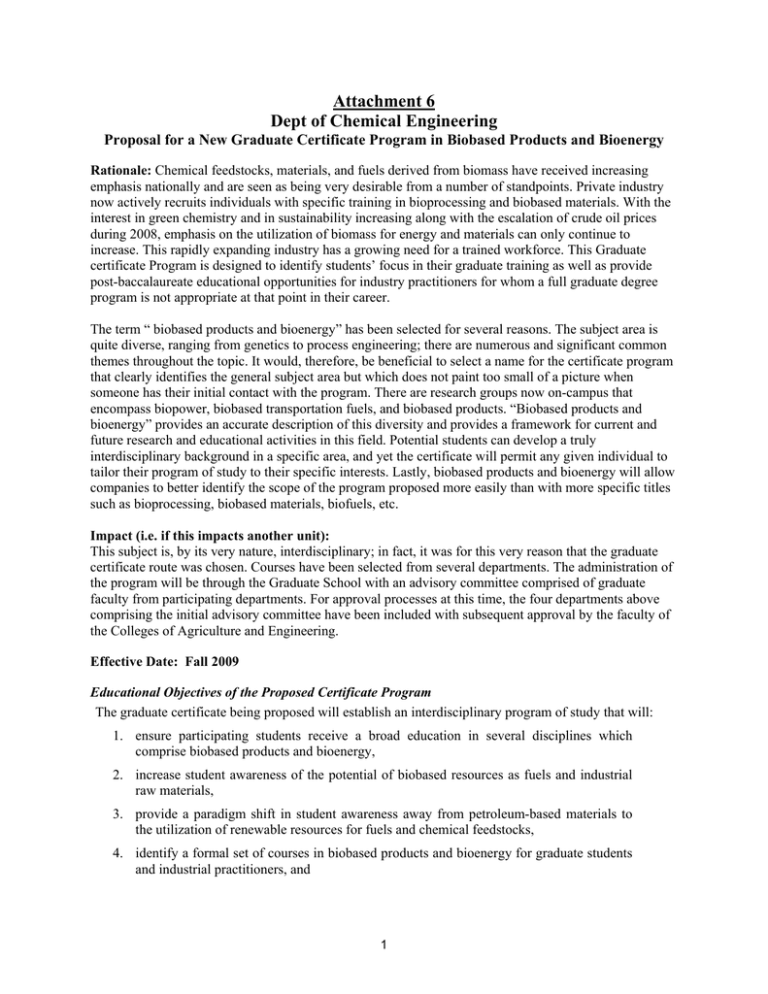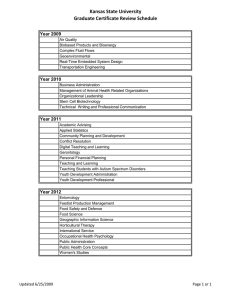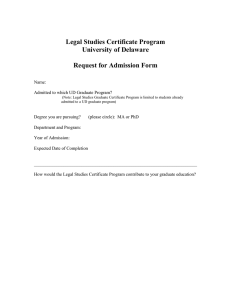Attachment 6 Dept of Chemical Engineering
advertisement

Attachment 6 Dept of Chemical Engineering Proposal for a New Graduate Certificate Program in Biobased Products and Bioenergy Rationale: Chemical feedstocks, materials, and fuels derived from biomass have received increasing emphasis nationally and are seen as being very desirable from a number of standpoints. Private industry now actively recruits individuals with specific training in bioprocessing and biobased materials. With the interest in green chemistry and in sustainability increasing along with the escalation of crude oil prices during 2008, emphasis on the utilization of biomass for energy and materials can only continue to increase. This rapidly expanding industry has a growing need for a trained workforce. This Graduate certificate Program is designed to identify students’ focus in their graduate training as well as provide post-baccalaureate educational opportunities for industry practitioners for whom a full graduate degree program is not appropriate at that point in their career. The term “ biobased products and bioenergy” has been selected for several reasons. The subject area is quite diverse, ranging from genetics to process engineering; there are numerous and significant common themes throughout the topic. It would, therefore, be beneficial to select a name for the certificate program that clearly identifies the general subject area but which does not paint too small of a picture when someone has their initial contact with the program. There are research groups now on-campus that encompass biopower, biobased transportation fuels, and biobased products. “Biobased products and bioenergy” provides an accurate description of this diversity and provides a framework for current and future research and educational activities in this field. Potential students can develop a truly interdisciplinary background in a specific area, and yet the certificate will permit any given individual to tailor their program of study to their specific interests. Lastly, biobased products and bioenergy will allow companies to better identify the scope of the program proposed more easily than with more specific titles such as bioprocessing, biobased materials, biofuels, etc. Impact (i.e. if this impacts another unit): This subject is, by its very nature, interdisciplinary; in fact, it was for this very reason that the graduate certificate route was chosen. Courses have been selected from several departments. The administration of the program will be through the Graduate School with an advisory committee comprised of graduate faculty from participating departments. For approval processes at this time, the four departments above comprising the initial advisory committee have been included with subsequent approval by the faculty of the Colleges of Agriculture and Engineering. Effective Date: Fall 2009 Educational Objectives of the Proposed Certificate Program The graduate certificate being proposed will establish an interdisciplinary program of study that will: 1. ensure participating students receive a broad education in several disciplines which comprise biobased products and bioenergy, 2. increase student awareness of the potential of biobased resources as fuels and industrial raw materials, 3. provide a paradigm shift in student awareness away from petroleum-based materials to the utilization of renewable resources for fuels and chemical feedstocks, 4. identify a formal set of courses in biobased products and bioenergy for graduate students and industrial practitioners, and 1 5. provide a documented course of study for students preferring a freestanding certificate program. Structure of the Proposed Graduate Certificate Program in Biobased Products and Bioenergy The graduate certificate program proposed will consist of a minimum of fifteen (15) credit hours of coursework selected from a series of courses approved by the Biobased Products and Bioenergy Certificate Committee (BPBCC). Each student will be required to complete at least one of the courses below, each of which includes content from more than one of the designated subject areas. In the case of students pursuing a graduate degree, the course cannot be selected from a student’s primary academic department. ֜ Crop Improvement and Biotechnology (AGRON 630) ֜ Cropping Systems (AGRON 640) ֜ Novel Uses of Renewable Biopolymers (GRSC 825) ֜ Biochemical Engineering (CHE 715) or Biological Process Engineering (BAE 545) or Fundamentals of Bioprocessing (GRSC 745) Each student will also be required to complete a variable (2 - 3) credit hour seminar/special topics course in which the students will be placed into multidisciplinary teams. This exercise is intended to provide a “capstone” experience. The nature of the problem will vary, including (but not limited to) design of an interdisciplinary, multi-investigator research proposition, an industrial problem taken from the “real world,” development of an extensive case study, or a product/process design experience. Each team will select from a list of interdisciplinary topics provided by either participating faculty or an industrial collaborator through the BPBCC. The faculty providing the problem will serve as the team’s advisor. The BPBCC will assist in finding a faculty advisor in the situation where an industrial collaborator may be involved. The faculty advisor will be responsible for determining the number of credit hours and awarding the grade. The teams will prepare a formal written report documenting their work at the end of the semester. While it is envisioned that a specific course co-listed amongst participating departments will be developed, several courses currently exist which can be utilized at this time to meet this requirement, including AGRON 600 (Crop Problems), AGRON 910 (Topics in Plant Breeding), AGRON 930 (Topics in Plant Genetics), BAE 620 (Problems in Agricultural Engineering), BAE 820 (Topics in Agricultural Engineering), CHE 802 (Selected Topics in Materials Science), CHE 805 (Selected Topics in Biochemical Engineering), GSI 790 (Grain Science Problem), and GSI 910 (Topics in Grain Science). The remaining coursework is to be selected from at least three of the following four subject areas: plant science, plant/crop production, processing, and utilization. Sufficient courses currently exist at KSU to deliver several courses in each of these subject areas; a list of courses from which students will select their coursework for this certificate program follows. The subject areas associated with the courses listed is given in the table at the end of this document. New courses will be added to support this program as appropriate. Courses must be taken from a minimum of three different academic departments to complete this graduate certificate program. The four courses above (AGRON 630, GRSC 825, CHE 715, and BAE 545) count towards the subject area and academic department requirements while also serving as the primary required course. Students will submit a proposed list of courses to be used in meeting the requirements for the certificate of graduate studies to the coordinator of the biobased products and bioenergy certificate program with the program of study being formally approved by the BPBCC. In addition, each student will participate in an exit interview with a member of the BPBCC at the completion of his or her certificate program. 2 List of the Courses Associated with the Certificate Existing courses proposed for inclusion in the biobased products and bioenergy graduate certificate program are listed below. This approved course list will be actively reviewed by the BPBCC and will be modified as needed. The course list is expected to be dynamic due to the changing availability and content of courses, new emphases within the topic area, and new developments within the subject area. Course Title 1. Crop Improvement and Biotechnology 2. Cropping Systems 3. Crop Physiology 4. Forage Management and Utilization 5. Applications of Nutrient Management 6. Site Specific Agriculture 7. Physical Properties of Soils 8. Plant Physiology 9. Advanced Plant Physiology I 10. Advanced Plant Physiology II 11. Biotechnology 12. Plant Genetics 13. Recombinant DNA Laboratory I 14. Recombinant DNA Laboratory II 15. Molecular Genetics Laboratory 16. Plant Molecular Biology 17. Introduction to Genomic Bioinformatics 18. Physical Studies of Biomacromolecules 19. Biochemistry I 20. Biochemistry II 21. Materials Chemistry 22. Biological Process Engineering 23. Fundamentals of Bioprocessing 24. Cereal Science 25. Starch Chemistry and Technology 26. Polymer Science and Engineering 27. Novel Uses of Renewable Biopolymers 28. Processing of Composite Materials 29. Physical Properties of Cereal Polymers 30. Surface Phenomena 31. Energy & Biofuel Engineering 32. Biomaterials Processing 33. Bioseparations 34. Biochemical Engineering 35. Extrusion Processing in the Food &Feed Course Number AGRON 630 AGRON 640 AGRON 840 AGRON 550 AGRON 625 AGRON 655 AGRON 746 BIOL 500 BIOL 800 BIOL 801 AGRON 610 PLPTH 610 AGRON 770 BIOCH 767 BIOCH 767 BIOL 676 PLPTH 880 PLPTH 890 BIOCH 590 BIOCH 755 BIOCH 765 CHM 820 BAE 545 GRSC 745 GRSC 602 GRSC 901 CHE 656 GRSC 825 CHE 648 GRSC 830 CHE 682 BAE 650 BAE 740/GRSC 740 CHE 626 CHE 715 GRSC 720 Certificate Program Administration As with other graduate certificate programs, the proposed graduate certificate in Biobased Products and Bioenergy will be administered by the Graduate School of Kansas State University, and, as such, will be monitored on a regular basis in the same manner as other graduate and graduate certificate programs. The Graduate School, according to established procedures, must approve all changes proposed in the future for the certificate of graduate studies being proposed. The Biobased Products and Bioenergy Certificate Committee (BPBCC) will be comprised of representatives from each participating department. Initial participants are the Departments of 3 Agronomy, Biological and Agricultural Engineering, Chemical Engineering, and Grain Science and Industry. Representation will broaden as other departments express an interest in assisting with program coordination. The BPBCC will review the biobased products and bioenergy certificate program annually. They will have the authority to approve modifications to the list of acceptable courses and to forward changes in the graduate certificate program to the Graduate School. This group will also approve each student’s program of study for the graduate certificate program and their selection of a capstone design experience. Estimated Budget to Support the Certificate Program The proposed certificate program has been designed to build upon existing research and teaching efforts related to biobased resources. The program as currently designed does not require new courses or faculty for implementation. Course enrollments are not expected to increase to the point that new sections will be required since many of the graduate students active in this area are already enrolling in these classes; thus, new sections of courses are not anticipated. Therefore, there is no budget request for implementation of this graduate certificate. Faculty Associated With or Contributing to the Certificate Program The faculty involved in teaching the necessary courses will vary from semester to semester. In addition, the students will have the option of selected their coursework from the list of courses above. Given these two facts, providing supporting documentation on the faculty potentially involved would become unmanageable very quickly. Thus, the focus here is on the BPBCC, which will provide direct oversight of the proposed certificate program. Abbreviated current curriculum vitae are submitted in Appendix III for the graduate faculty who will initially serve on this Committee as they will be the individuals providing program governance. The current members of the BPBCC are listed below. ֜ Susan Sun (Grain Science and Industry) ֜ John R. Schlup (Chemical Engineering) ֜ Scott Staggenborg (Agronomy) ֜ Donghai Wang (Biological and Agricultural Engineering) Program Coordinator The program coordinator will be selected each year from among current members of the BPBCC. During the initial year following approval of the graduate certificate, Dr. John R. Schlup will serve in this capacity. Student Learning Outcomes and Assessment Plan While the student learning outcomes and assessment plan are described below, these subjects are detailed in the requested format in Appendix IV. The participants in the Biobased Products and Bioenergy graduate certificate program will have diverse academic backgrounds and most likely widely varying academic and career goals. Therefore, the program itself centers on designing an individualized program of study from a menu of courses. The student learning outcomes, thus, do not focus on specific topics, but rather on integration of existing course content in a manner to meet student needs in this very interdisciplinary field. Student Learning Outcomes: 1. Broad education in several disciplines integral to biobased products and bioenergy. 4 2. Demonstrated ability to utilize biobased and other renewable resources as energy sources and industrial raw materials as opposed to petroleum-based feedstocks. 3. Demonstrated ability to integrate the subject areas identified above in their understanding and implementation of biobased products and bioenergy. No new courses are being proposed, and, as existing courses, each is a part of the assessment process within their respective departments. Thus, learning outcomes will not be identified with each course. The selection of the courses ensures that the required subject areas are available to and accessed by the students; the structure of the program ensures exposure of the students to the necessary disciplines. Each of the choices for a student’s required (foundational) course provides a basis for understanding renewable resources as feedstocks instead of petrochemicals. University-Wide SLOs for Graduate Programs Graduate Certificate Program Student Learning Outcomes Knowledge Skills Broad education in several disciplines Ability to utilize biobased and other renewable resources Ability to integrate the subject areas XX XX Attitudes and Conduct Program SLO is Conceptually Different from University SLOs XX XX XX XX Assessment Methods for Each Outcome Assessment will focus on the ability of the student to integrate course material and to implement that material in addressing issues related to biobased products and bioenergy. Broad education in several disciplines integral to biobased products and bioenergy • Completion of an approved (by BPBCC) program of study meeting subject matter criteria (direct measure). • The BPBCC will administer an exit survey to each student at the completion of their program (indirect measure). Demonstrated ability to utilize biobased and other renewable resources as energy sources and industrial raw materials as opposed to petroleum-based feedstocks • Review of the student’s multidisciplinary team project resulting from participation in the seminar course (direct measure). 5 • The BPBCC will administer an exit survey to each student at the completion of their program (indirect measure). Demonstrated ability to integrate the subject areas identified above in their understanding and implementation of biobased products and bioenergy • Review of the student’s multidisciplinary team project resulting from participation in the seminar course (direct measure). • The BPBCC will administer an exit survey to each student at the completion of their program (indirect measure). It should be noted that the essence of the assessment process centers on the student’s multidisciplinary team project resulting from participation in the seminar course. This provides a very direct measure, similar to that of a portfolio. These assessments will be implemented from the outset of the program. The assessed outcomes will be reviewed annually by the BPBCC. The recommendations based upon this review will be utilized for modifications of the graduate certificate including, but not limited to, inclusion of courses within the program, program requirements, desired outcomes, and appropriateness of assessment tools. 6


